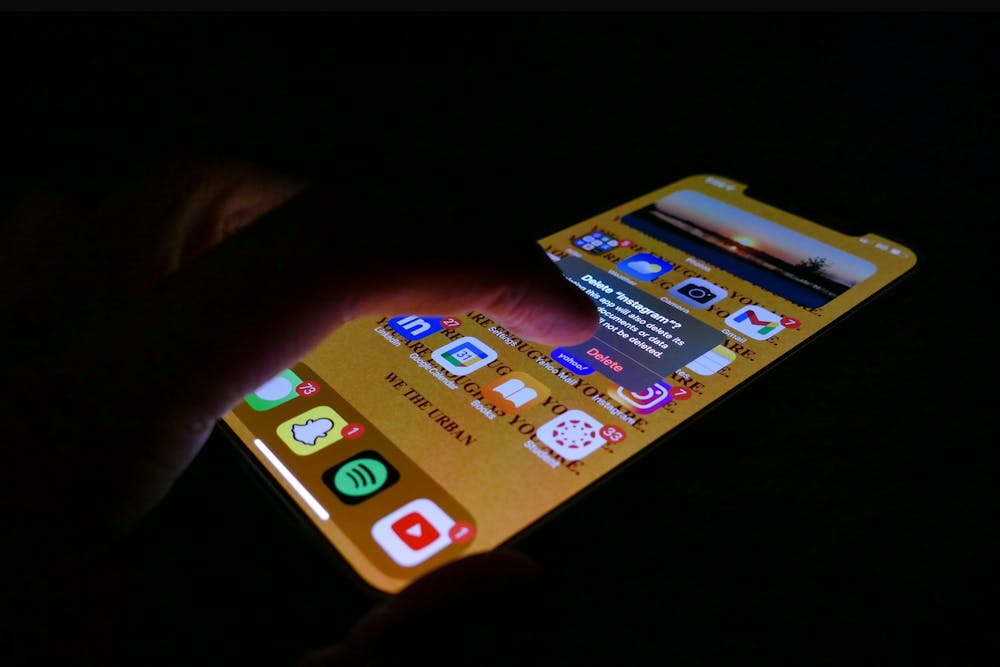
Sometimes, I catch myself doing it — my least favorite repertoire. I open up my phone and scroll through Snapchat, Instagram, or whatever social media platform fancies me at that moment to avoid the awkwardness of a social situation, to appear busy, to fill my boredom, or to procrastinate completing important tasks, such as homework, laundry, or exercise.
I’ve been trying to be more mindful of how much time I spend on my phone over this past year. Particularly during quarantine, I intentionally filled my days with activities such as running, baking, and reading because I feared the state of despondency I might slip into if I spent my entire days immobile and sucked into the world of virtual reality. One of the first steps I took was deleting TikTok. Within the past week, I put stringent time limits on my Instagram use. I haven't looked back since, but I still struggle with social media as a whole.
Admittedly, it’s hard to not mindlessly scroll on apps designed to be addictive. Lately, I’ve not only been upset that I’ve been sucked into this meaningless, curated version of life, but also because I’ve realized how much I’m missing out on in the real world. I’ve started to think about how I could spend those four to six hours of screen time in more enriching ways, such as reading, learning how to play an instrument, exploring new areas of Philadelphia, engaging in conversations with other students, or even just enjoying the peace of mind without a buzzing distraction in my pocket.
We’ve all heard that social media is linked to mental health issues, such as an increased risk of anxiety and depression. But that’s not to say that social media is the root of the problem. The transition between teenagehood and adulthood is an uncomfortable, trying time in our lives. Social media not only heavily exacerbates the preexisting issues associated with this age but adds novelty to them. We are figuring out who we are, and we are making many mistakes along the way. It only becomes that much more difficult to do so when there is a constant feed of photos, videos, and messages sitting at our fingertips.
Not only does social media interfere with our ability to meaningfully construct our individual self-concept, but it also interferes with our ability to maintain focus. Sometimes I check my phone out of pure habit — even when I don't get a notification. I believe this is a symptom that I, along with others, experience from the neurological effects of social media. Because we are becoming more accustomed to our attention being fragmented between the virtual and real world, we are losing our ability to concentrate diligently on one task and execute it efficiently.
Concentration is not the only realm in which social media has a real world outcome.
Equally important is the power that social media has on political communication and political outcomes. Netflix’s “Social Dilemma” delineates how social media enables political disinformation to disseminate with unprecedented ease and how these same algorithms isolate the viewer’s content to only heighten and intensify their views. The number of countries with political disinformation campaigns on social media doubled in the past two years, and a startling 64% of people who joined extremist groups on Facebook did so because the algorithms directed them there. It’s clear that people on both sides of the political spectrum are being drawn toward extremism directly because of what they see on their Facebook, TikTok, and Instagram feeds. This sharp divisiveness contributes to a diminished mutual understanding and compassion within American political discourse, and more saliently, the American citizenry.
A deceptively strong case for social media is that it keeps us connected with people all around the world. The reason this case is deceptive is two-pronged. One, social media connects us through a carefully curated version of life that does not exist in reality, so it’s not really connecting us. Two, this case circumvents the truth that social media is not the only avenue of communication. Don’t we usually stay in touch with the ones we really love via calling and messaging, anyways?
I know that it’s hard to imagine actually deleting all forms of social media because it has such a formidable presence in everyday life. In an effort to be realistic, I propose to you that maybe you shouldn't go cold turkey; perhaps a slow cessation by setting app time limits, or even disconnecting for hours at a time by turning your phone on Airplane Mode would be a more appealing and efficacious approach.
Join me in being happier, more focused, more engaged, and more compassionate: lessen your time spent (or even delete) social media.
ALLISON SANTA-CRUZ is a College first year studying philosophy, politics, and economics from Jackson, Miss. Her email address is allisant@sas.upenn.edu.
The Daily Pennsylvanian is an independent, student-run newspaper. Please consider making a donation to support the coverage that shapes the University. Your generosity ensures a future of strong journalism at Penn.
Donate



